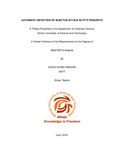| dc.contributor.author | Sodiq, Idowu Ibrahim | |
| dc.date.accessioned | 2020-05-21T16:18:25Z | |
| dc.date.available | 2020-05-21T16:18:25Z | |
| dc.date.issued | 2019-06-20 | |
| dc.identifier.uri | http://repository.aust.edu.ng/xmlui/handle/123456789/4963 | |
| dc.description.abstract | Malicious user requests pose a vicious threat to backend devices which execute them; more so, could result in the compromise of other user accounts, exposing them to theft and blackmail. It becomes imperative to sanitize such requests before they are treated by the servers as access to a single malicious request is enough to cause a disaster. A number of authors suggest that sanitizing models built on support vector machines guarantee optimum classification of malicious from non-malicious requests. In this work, we have been able to establish that the use of ensemble learner provides a better
performance, especially when associated with a strong classifying tool like decision tree. | en_US |
| dc.description.sponsorship | AUST and AfDB | en_US |
| dc.language.iso | en | en_US |
| dc.subject | Sodiq Idowu Ibrahim | en_US |
| dc.subject | Dr. Victor Odunmuyiwa | en_US |
| dc.subject | 2019 Computer Science Theses | en_US |
| dc.title | Automatic Detection of Injecton Attack in Http Requests | en_US |
| dc.type | Thesis | en_US |

